|
|
|
Sort Order |
|
|
|
Items / Page
|
|
|
|
|
|
|
| Srl | Item |
| 1 |
ID:
096823
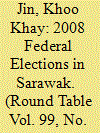

|
|
|
|
|
| Publication |
2010.
|
| Summary/Abstract |
In the aftermath of the 8 March elections, Sarawak was cast as an outlier, recalcitrant even, to the perceived 'revolt' against the incumbent Barisan Nasional. This short note attempts to show that Sarawak actually fell within the overall voting pattern viewed in its total range, rather than in summary outcomes. In that context, the note then attempts to argue that the voting patterns can be accounted for by local reasons, hopes and fears, particularly in the case of the minority indigenous groups collectively categorised as 'Other bumiputera'. However, Chinese and Malay constituencies exhibited a pattern clearly correlated to ethnicity.
|
|
|
|
|
|
|
|
|
|
|
|
|
|
|
|
| 2 |
ID:
157957
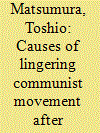

|
|
|
|
|
| Summary/Abstract |
This article focuses on the communist movement on both sides of the border in Sarawak and West Kalimantan around 1965 when the September Thirtieth Movement (abortive coup) took place in Jakarta. The people in Sarawak were seeking independence and opposed to being integrated into the Federation of Malaysia in the first half of the 1960s. However, after the September Thirtieth Movement, the communist movement in Sarawak started losing support both domestically and internationally (especially support from Indonesia). Nevertheless, even with the persecution by Suharto’s army, the Sarawak guerrillas and the Indonesian Communist Party in West Kalimantan cooperated in their struggle for a few years after 1965. This situation was aided by the remoteness of these areas from the centers of the nation-states (Malaysia and Indonesia) and also by the cooperation between the guerrillas and the local Chinese in West Kalimantan.
|
|
|
|
|
|
|
|
|
|
|
|
|
|
|
|
| 3 |
ID:
108327
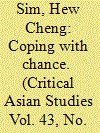

|
|
|
|
|
| Publication |
2011.
|
| Summary/Abstract |
This article examines the nature of agrarian transition and rural transformation in the Malaysian state of Sarawak on the island of Borneo. Although rural change is not new on the island, the speed and penetration wrought by current processes of change is far-reaching. The consequences have been uneven for indigenous communities: some have benefited from infrastructure projects like roads and schools and from proximity to employment in urban centers, but others have lost their land and face a depleted natural resource base and increasing difficulties in making a living in the village. This article argues that these processes are gendered in nature as men and women decide either to leave (whether singly or with their families) or stay put in the villages. Little research has been done on the gender dimension of agrarian transition in Sarawak. This article pieces together fragmented accounts to present a picture of how women effect as well as are affected by these changes.
|
|
|
|
|
|
|
|
|
|
|
|
|
|
|
|
| 4 |
ID:
147869
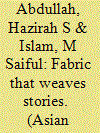

|
|
|
|
|
| Summary/Abstract |
This article examines the process of identity construction among the Iban indigenous people of Sarawak in Malaysia through pua kumbu – their sacred and ritual cloth. Although the Ibans are popularly known for their headhunting practices and longhouse dwellings, these cultural practices are in major decline and therefore pua kumbu is brought to the forefront as a significant means of identity construction. By illustrating the meanings, narratives, and ceremonies associated with pua kumbu, this article demonstrates that pua kumbu is not just a piece of sacred or ritual cloth; rather, it has significant meanings in the everyday life of the Ibans. It connects the Ibans with distinctly eternal meanings of their life and cosmology, past histories, and their connections to the physical environment. It thus helps the process of maintaining a boundary and identity construction of the Ibans by distinguishing between ‘us and them’ – the Ibans and others.
|
|
|
|
|
|
|
|
|
|
|
|
|
|
|
|
| 5 |
ID:
143895
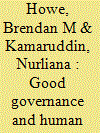

|
|
|
|
|
| Summary/Abstract |
Good governance is an essentially contested concept. In Asian countries, economic efficiency and macro-economic projects have predominantly been pursued with the aim of promoting national, aggregate measurements of development. Hydroelectric power generation projects have played a central role in the national planning of several regional states as part of an attempt to achieve these goals. Even by their own terms of reference, however, hydroelectric power projects have at most a mixed record of success, and are increasingly criticized with regard to their negative impact on the environment, and upon vulnerable groups. The government of Malaysia has embraced the “developmental state” model, and this is best illustrated by governance initiatives and resource exploitation in the East Malaysian states of Sarawak and Sabah and their respective “development corridors”. Sarawak’s Corridor of Renewable Energy (SCORE) is the most visible sign of Malaysia’s macro-economic hydroelectric development focus, as Sabah’s corridor focuses on trade, investment, and tourism. This article takes a critical perspective towards good governance, emphasizing that it should function in the interests of all society, but in particular the most vulnerable. It therefore addresses the impact of Malaysian hydroelectric development policies on one of the most vulnerable sections of Malaysian society, the indigenous peoples of Sarawak. The findings cast doubt on the validity of continued prioritization of hydroelectric dam construction as a cornerstone of government energy and development policy.
|
|
|
|
|
|
|
|
|
|
|
|
|
|
|
|
| 6 |
ID:
103148
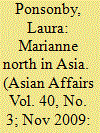

|
|
|
|
|
| Publication |
2009.
|
| Summary/Abstract |
Marianne North, a well-to-do and well-connected Victorian lady painter, made a number of expeditions to all parts of the world to paint plants and flowers in their native habitat. Over 800 of her paintings are displayed in a special gallery which she donated to Kew Gardens. The article concentrates on her travels in various parts of Asia, especially Japan, Sarawak, Java, Ceylon and India.
|
|
|
|
|
|
|
|
|
|
|
|
|
|
|
|
| 7 |
ID:
079670
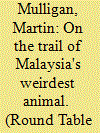

|
|
|
|
|
| Publication |
2007.
|
| Summary/Abstract |
The rainforests and mangrove wetlands of Malaysia and Southeast Asia are among Earth's most naturally rich environments; temperate countries are poor by comparison. A high proportion of animals and plants in these tropical rainforests, the outcome of 60 million years of evolution, live nowhere else. So the importance of work to conserve this region is apparent. Yet much of this work is left to the so-called GONGOS - or government-owned non-governmental organizations. The GONGO is a species of organization that is found world-wide wherever democracy is new or fragile or otherwise less than fully functioning. Despite frustrations and constraints, however, tiny groups of idealists within this framework may influence and even transform government policy
|
|
|
|
|
|
|
|
|
|
|
|
|
|
|
|
| 8 |
ID:
113984
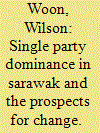

|
|
|
|
|
| Publication |
2012.
|
| Summary/Abstract |
Sarawak, formerly a British colony prior to the formation of Malaysia, has been ruled by the Barisan Nasional (BN) coalition for over four decades. Although the BN's political domination has been robust, it has never been smooth sailing, particularly in the 1960s and mid-1980s. The crises in the 1960s were resolved partly by the timely and swift interventions of the British and the core BN parties based in Peninsular Malaysia, albeit with resistance from local political parties. When a leadership crisis in the Sarawak BN erupted in mid-1980s, the coalition gained firm control over the state apparatus. This enabled the embattled Chief Minister to utilize the state's resources to fend off opponents, rally the support of the electorate and subsequently retain control of the state. After more than two decades of relatively unchallenged rule, recent events such as the revolt of urban voters, the emergence of a strong opposition coalition and the impending resignation of Taib Mahmud - the most powerful figure in Sarawak and the longest serving Chief Minister in the country - have indicated that a change in political hegemony could be in the making. However, the most important factor that would bring about such a change, a revolt of rural voters, does not seem likely to happen in the near future.
|
|
|
|
|
|
|
|
|
|
|
|
|
|
|
|
| 9 |
ID:
094114
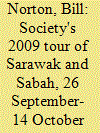

|
|
|
|
|
|
|
|